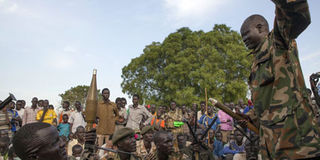Crimes against humanity witnessed in South Sudan - Amnesty

Members of the White Army, a South Sudanese anti-government militia, listen to a speech given by Gathoth Gatkuoth (R) during a rally in Nasir on April 14, 2014. Amnesty International says South Sudan has already witnessed crimes against humanity even as key adversaries prepare to meet in Addis Ababa, Ethiopia on Friday. AFP/PHOTO
What you need to know:
Timeline of events in the South Sudan conflict:
- Dec 15, 2013: Delegates disagree at a national political conference in Juba, those allied to Machar walk out.
- Dec 16, 2013: Soldiers allied to Machar mutiny and fights starts, esclates around the country
- Dec 17, 2013: Salva Kiir warns inciters will be prosecuted assures security for all
- Dec 18, 2013: Riek Machar denies having a hand in the mutiny, says it was Kiir
- Dec 27, 2013: Kenya hosts an Intergovernmental Authority on Develiopment (Igad) meeting to seek peac solution for South Sudan. Igad gives ultimatum on ceasefire
- January 24, 2014: Parties sign ceasefire agreement, and another agreement on release of political prisoners, in Addis Ababa Ethiopia.
- January 29, 2014: South Sudan releases seven of the 11 political prisoners to Kenya
- February 12, 2014: Second phase of talks start in Addis Ababa, but derail as parties accuse each other of restarting attacks
- March 3, 2014: IGAD announces that talks will go to recess
- March 7, 2014: African Union established a commission of inquiry, starts its work a month and a half later
- March 25, 2014: Talks resume in Addis Ababa
- April 17, 2014: UN mission in Bor is attacked leaving 50 dead
- April 25, 2014: South Sudan releases the remaining political prisoners
- May 2, 2014: UN warns fighting will lead to genocide
- May 5, 2014: Rebels and South Sudan government sign a re-commitment to stop fighting
May 9, 2014: Kiir and Machar expected to meet face-to-face for the first time in Addis
A global human rights campaigner says South Sudan has already witnessed crimes against humanity even as key adversaries prepare to meet in Addis Ababa, Ethiopia on Friday.
In a situation report released on Thursday, Amnesty International reports that “horrific” attacks by soldiers loyal to either President Salva Kiir or his nemesis Riek Machar have left behind a catalogue of violations that qualify to be crimes against humanity.
“All parties to the conflict in South Sudan have deliberately targeted civilians; subjected them to sexual violence including rape; destroyed and looted civilian property, including their means of livelihood; attacked humanitarian personnel and property, and killed captured soldiers and other fighters placed hors de combat,” Amnesty International stated in its report.
“They have obstructed humanitarian assistance, including medical and food supplies, preventing them from reaching civilian populations displaced by the conflict. These acts are war crimes and crimes against humanity.”
The document titled, ‘nowhere is Safe: Civilians under Attack in South Sudan’ is a collection of first-hand narratives from more than 100 survivors of the attacks, those sexually assaulted in Juba, Malakal, Bor and Bentiu, and witnesses to fighting that broke out mid December 2013. It also includes interviews with government officials, opposition representatives and UN officials.
AI reports that civilians have “deliberately” been killed, captured soldiers killed, women kidnapped or raped as other civilians are arbitrarily detained. Others have been disappeared. To date, it is estimated that more than 10,000 people have been killed.
Though conducted in March, AI observers say civilians have been “systematically targeted in towns and villages, in their homes, as well as in churches, mosques, hospitals and even UN compounds where they had sought refuge.” In its wake, AI researchers report they found human skeletons, dogs feeding on decomposing bodies as well as mass graves in towns like Bor which had as many as 530 bodies stuffed in.
This is besides the looting and destruction of homes and medical facilities, a situation AI says complicates chances of survival for those who escaped the maiming.
“This research reveals the unimaginable suffering of many civilians unable to escape the growing spiral of violence in South Sudan. Civilians have been massacred in the very places where they sought refuge,” Michelle Kagari, Amnesty International’s Deputy Regional Director for Eastern Africa said at the launch.
Amnesty International blames “Forces on both sides” for showing no concern for human rights and accuses those “up and down” the chain of command for fueling the violence and demands that they be held accountable.
The report comes a day to the expected first face-to-face meeting between President Kiir and Mr Machar, five months after fighting broke out in Juba before spreading to other parts of South Sudan. Amnesty International though wants the UN Mission in South Sudan to focus on protecting civilians for the moment, as talks go forward.
On Monday, both sides signed a “Re-commitment on Humanitarian Matters in the Cessation of Hostilities Agreement between the Government of the Republic of South Sudan and SPLM/A (In Opposition)”. This was an agreement that followed the apparent breach of an earlier deal reached in January to stop hostilities, brokered by regional bloc IGAD.
Although the conflict was touched off by a spark of disagreement within the SPLM, both the UN and AI say it now ethnic with victims being recipients of first attacks or revenge attacks. In general, the most affected communities are the Dinka mostly loyal to Kiir, Nuer mostly loyal to Machar and the Shilluk.
So far, about 950,000 people have been displaced within South Sudan, and another 290,000 have fled to neighbouring countries including Kenya and Uganda.





